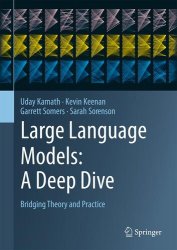Large Language Models: A Deep Dive
- Добавил: literator
- Дата: 21-08-2024, 18:24
- Комментариев: 0
 Название: Large Language Models: A Deep Dive: Bridging Theory and Practice
Название: Large Language Models: A Deep Dive: Bridging Theory and PracticeАвтор: Uday Kamath, Kevin Keenan, Garrett Somers
Издательство: Springer
Год: 2024
Страниц: 496
Язык: английский
Формат: pdf (true)
Размер: 30.7 MB
Large Language Models (LLMs) have emerged as a cornerstone technology, transforming how we interact with information and redefining the boundaries of Artificial Intelligence (AI). LLMs offer an unprecedented ability to understand, generate, and interact with human language in an intuitive and insightful manner, leading to transformative applications across domains like content creation, chatbots, search engines, and research tools. While fascinating, the complex workings of LLMs―their intricate architecture, underlying algorithms, and ethical considerations―require thorough exploration, creating a need for a comprehensive book on this subject.
This book provides an authoritative exploration of the design, training, evolution, and application of LLMs. It begins with an overview of pre-trained language models and Transformer architectures, laying the groundwork for understanding prompt-based learning techniques. Next, it dives into methods for fine-tuning LLMs, integrating reinforcement learning for value alignment, and the convergence of LLMs with computer vision, robotics, and speech processing. The book strongly emphasizes practical applications, detailing real-world use cases such as conversational chatbots, retrieval-augmented generation (RAG), and code generation. These examples are carefully chosen to illustrate the diverse and impactful ways LLMs are being applied in various industries and scenarios.
Not surprisingly, LLMs are highly competent at generating computer programming language and natural language. The most popular solution in this space is Github Copilot, which was designed to assist human programmers in developing software using computer code. Since it is the most popular solution in this space, below we will look at its core capabilities as an exemplar of the types of benefits that these types of LLM-enabled applications provide.
• Code auto-completion, which can provide functionality as simple as traditional tab completion solutions for function/method and variable name completions and as complex as recommending entire code blocks based on real-time analysis of the existing code in a given script.
• Multiple programming language support allows developers to interoperate across coding languages efficiently. This capability is most useful in full-stack or specialist-domain application development, where multiple programming languages are used for different solution components. Imagine a full-stack developer writing data handling routines in jаvascript for the user interface. At the same time, Copilot suggests code blocks in Python for the back-end API that serves the data to the front-end. As of the time of writing, Github Copilot supports all programming languages available within public Github repositories. However, Copilot’s competency in these languages is a function of that language’s representation in Github public repository code. Interested readers are encouraged to explore GitHut to understand better the relative proportions of different coding languages on Github.
• Natural language understanding enables users to specify the functionality or capabilities they would like computer code for through natural language prompting. This can often be achieved by simply writing comments describing what the subsequent code does. If Github Copilot is active for that script, it will recommend code to achieve the descriptions in the comments. These recommendations can provide surprisingly elegant code solutions to many problems and benefit from the wider context of the script being developed, especially if it is well commented/documented. Such functionality has clear benefits from an efficiency perspective. However, as always with LLM generation, users should validate and test recommended code carefully to safeguard against LLM failstates.
• Code refactoring and debugging is another efficiency-improving capability of Github Copilot. Refactoring can be achieved thanks to the scale of code on which the system has been trained. Invariably, during this process, the LLM has learned many variants of code solutions for the same or similar problems, allowing it to provide alternative patterns for users to consider. Similarly, repetitive code, say for defining a class in Python, can be provided by Copilot as a boilerplate so that the developer can focus on only the functional components of the code, saving additional time. From a debugging perspective, Github Copilot can interpret execution errors or descriptions of unexpected outputs from code in the context of the code itself and the developer’s description of what the code is intended to do to help identify candidate issues within the code. At a higher level, Copilot can also provide natural language explanations of execution flows and code functionality, further assisting the developers in exploring potential root causes for execution issues.
The aspects listed above contribute to increased efficiency in software development. Using a coding copilot can reduce the effort required to achieve effective and functional code, which traditionally might involve the use of reference textbooks, many visits to websites such as Stack Overflow or Github Gists, and code reviews by peers. Thanks to coding copilots, developers can achieve similar learning and feedback through a single intuitive interface. This is especially true thanks to some of the efforts to integrate coding copilots into popular Integrated Development Environments, such as Visual Basic Code, Vim, and JetBrains.
Скачать Large Language Models: A Deep Dive
Внимание
Уважаемый посетитель, Вы зашли на сайт как незарегистрированный пользователь.
Мы рекомендуем Вам зарегистрироваться либо войти на сайт под своим именем.
Уважаемый посетитель, Вы зашли на сайт как незарегистрированный пользователь.
Мы рекомендуем Вам зарегистрироваться либо войти на сайт под своим именем.
Информация
Посетители, находящиеся в группе Гости, не могут оставлять комментарии к данной публикации.
Посетители, находящиеся в группе Гости, не могут оставлять комментарии к данной публикации.
